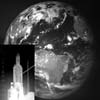| . |  |
. |
The next decade will see nations scrambling to build outposts on the moon with each adapting different strategies to use it as a base to explore space, according to scientists attending a conference on lunar exploration. The United States welcomes competition while the Europeans and other national space programs favour a cooperative robotic village lunar base, a settlement where each nation has its own place on the moon, they said. The Indians, like the Japanese, are aiming for a lunar mission to galvanise its scientific community while China's plans are not immediately clear. "If they want to compete, then let them compete," said Paul Spudis, planetary scientist at the Johns Hopkins University and advisor to NASA at the five-day International Conference on Exploration and Utilization of the Moon being held in the north Indian city of Udaipur. "It spurs innovation." The United States is planning a lunar orbiter by 2008 to be followed the next year by a landing mission. By 2015 it plans to put another man on the moon. "The goal of the vision is to cut the chord from the earth and create the ability to go elsewhere in the solar system with any kind of capability we want, not just people but with robots or radars," Spudis said. The last man on the moon was NASA astronaut Eugene Cernan on December 11, 1972, three years after Neil Armstrong became the first person to touch lunar soil on July 21, 1969. Other space powers, such as Europe, have plans to set up a robotic village on the moon by 2014 for a permanent lunar base to exploit resources and plan a trip to Mars. "I think it can be an Olympic race where everyone gets the best from themselves. But it should not be a race where some others are prevented from the benefits of the Olympic exercise," said Bernard Foing, director of the International Lunar Exploration Working Group. "At some stage the moon is a great place to do things together. That is a concept we propose for the future," said Foing, whose group coordinates the plans among international agencies including the US, Russia, Japan, China and India and Europe. He is also the chief scientist of the European Space Agency. Japan will be the first to send an orbiter to the moon in 2006. China could follow, ahead of India's unmanned lunar mission in 2007 or 2008. The European Space Agency plans to launch an orbiter to the moon by 2008 and a second mission, a lander, in 2009 or 2010 to be followed by a human flight in 2020. Wu Ji, a scientist at China's Centre for Space and Applied Research, said his country's lunar programme would be the "third milestone" after it sent satellites and, last year, a manned Earth orbiter. "The lunar mission will be the starting point to go to deep space," Wu said. "We are not talking about a manned mission. It is out of the question now. I cannot talk too much about our space programme right now." Madhavan Nair, chief of the Indian Space Research Organisation, said an unmanned lunar mission would upgrade the country's technological capabilities and provide opportunities to planetary scientists. Meanwhile, former director of the Tata Institute of Fundamental Research in Bombay, M. G. K. Menon, warned scientists not to colonise the moon. "One should not treat the moon as an object where we are all scrambling for just prestige and first-occupancy," Menon said. The 1979 Moon Treaty, to prevent the moon from becoming an area of international conflict, has only been ratified by nine nations. It has been rejected by both the United States and Russia. All rights reserved. � 2004 Agence France-Presse. Sections of the information displayed on this page (dispatches, photographs, logos) are protected by intellectual property rights owned by Agence France-Presse. As a consequence, you may not copy, reproduce, modify, transmit, publish, display or in any way commercially exploit any of the content of this section without the prior written consent of Agence France-Presse. Related Links SpaceDaily Search SpaceDaily Subscribe To SpaceDaily Express  Udaipur, India (AFP) Nov 23, 2004
Udaipur, India (AFP) Nov 23, 2004A spectacular portrait of earth and its satellite, the moon, together has been captured for the first time during an eclipse by a space camera, the European Space Agency said Tuesday.
|
| ||||||||||
| The content herein, unless otherwise known to be public domain, are Copyright 1995-2016 - Space Media Network. All websites are published in Australia and are solely subject to Australian law and governed by Fair Use principals for news reporting and research purposes. AFP, UPI and IANS news wire stories are copyright Agence France-Presse, United Press International and Indo-Asia News Service. ESA news reports are copyright European Space Agency. All NASA sourced material is public domain. Additional copyrights may apply in whole or part to other bona fide parties. Advertising does not imply endorsement, agreement or approval of any opinions, statements or information provided by Space Media Network on any Web page published or hosted by Space Media Network. Privacy Statement All images and articles appearing on Space Media Network have been edited or digitally altered in some way. Any requests to remove copyright material will be acted upon in a timely and appropriate manner. Any attempt to extort money from Space Media Network will be ignored and reported to Australian Law Enforcement Agencies as a potential case of financial fraud involving the use of a telephonic carriage device or postal service. |